Lexis Supplements
Lexis Studies in Greek and Latin Literature | Lexis Ancient Philosophy |
Lexis Sources, Texts and Commentaries
open access
| peer reviewed
Aims & Scope
The series mainly includes original studies devoted to classical literature and the classical heritage in the medieval and modern literary civilization, as well as collections of writings by philologists of recognized international value. It is also open to philosophical and historical studies with a strong focus on textual sources.
Permalink doi.org | e-ISSN 2724-3362 | ISSN 2210-8866 | Language en, es, fr, it |
Subseries
Lexis Ancient Philosophy
e-ISSN
2784-9759
ISSN
2784-9201
Lexis Sources, Texts and Commentaries
e-ISSN
2784-9937
ISSN
2784-9287
Lexis Studies in Greek and Latin Literature
e-ISSN
2724-0142
ISSN
2724-377X
Copyright This is an open-access work distributed under the terms of the Creative Commons Attribution License (CC BY). The use, distribution or reproduction is permitted, provided that the original author(s) and the copyright owner(s) are credited and that the original publication is cited, in accordance with accepted academic practice. The license allows for commercial use. No use, distribution or reproduction is permitted which does not comply with these terms.
Latest published volume

- Everyday Communication in Antiquity: Frames and Framings
- Klaas Bentein
- April 24, 2025
This volume explores everyday communication practices in Greco-Roman and Late Antique Egypt, with a particular focus on Greek papyri and related sources. It examines how language, layout, and materiality – manifesting overtly or subtly, at global and local levels – shaped the production and interpretation of texts. Grounded in a ‘frame-based’ approach, the chapters draw on sociolinguistics, pragmatics, and multimodality to reveal how ancient writers and readers constructed meaning and articulated identities across genres, languages, and cultural contexts.
- 9 download 154 search
- 5 • La parola-segnale come criterio di scelta fra diverse proposte testuali
- Illuminating Texts
- 5 download 187 search
- 3 • Parole-segnale in linea e interlinea in manoscritti dal nono al quindicesimo secolo
- Illuminating Texts
- 18 download 157 search
- 1 • Un antico usus emendandi: integrazione e correzione con parola-segnale
- Illuminating Texts
- 14 download 120 search
- 2 • Parole-segnale a margine in manoscritti dal quarto al quindicesimo secolo
- Illuminating Texts
- 24 download 239 search
- 6 • Proposte testuali suggerite dalla parola-segnale
- Illuminating Texts
- 7 download 124 search
- 4 • La riscoperta della parola-segnale in edizioni e studi moderni
- Illuminating Texts
- 5 download 44 search
- Frames, Framings and Beyond
- Klaas Bentein, Marianna Thoma
- April 24, 2025 | Everyday Communication in Antiquity: Frames and Framings
- 6 download 50 search
- Connecting Intersubjectivity, Politeness and Stance with Wishes in the Post-Classical Greek Papyri
- Ezra la Roi
- April 24, 2025 | Everyday Communication in Antiquity: Frames and Framings
- 6 download 36 search
- The Influence of Atticism on Non-Literary Papyri: The Case of θᾶττον
- Chiara Monaco
- April 24, 2025 | Everyday Communication in Antiquity: Frames and Framings
- 14 download 67 search
- Spacing Out Speech Acts
- Klaas Bentein, Marta Capano
- April 24, 2025 | Everyday Communication in Antiquity: Frames and Framings
- 19 download 60 search
- Medium, Procedures and Conventions
- Serena Causo
- April 24, 2025 | Everyday Communication in Antiquity: Frames and Framings
- 12 download 46 search
- Exploring Frame-Based Approaches to Everyday Communication in Antiquity
- Klaas Bentein
- April 24, 2025 | Everyday Communication in Antiquity: Frames and Framings
- 10 download 49 search
- Requests in the Qurra Dossier
- Fokelien Kootstra-Ford, Klaas Bentein
- April 24, 2025 | Everyday Communication in Antiquity: Frames and Framings
- 7 download 44 search
- Framing the Bad Guys: Continuative Clauses in the Depiction of the Wrongdoer in Papyrus Petitions
- Eleonora Cattafi
- April 24, 2025 | Everyday Communication in Antiquity: Frames and Framings
- 6 download 38 search
- Competing Grammars and Language Change: Evidence from Correction and Revision Processes in the Private Papyri from Ptolemaic Egypt
- Carla Bruno
- April 24, 2025 | Everyday Communication in Antiquity: Frames and Framings
- 7 download 43 search
- Seeing the (Smaller and) Bigger Frame: Framing Late Antique Egyptian Writers and Documents Through Bilingual and Biscriptal Choices
- Antonia Apostolakou
- April 24, 2025 | Everyday Communication in Antiquity: Frames and Framings
- 2 download 27 search
- Il folle e l’oracolo. Paradeigmata noluntatis in Platone
- Elisabetta Cattanei
- March 13, 2025 | Paradeigmata voluntatis 2
- 5 download 39 search
- Arcesilao e la teoria stoica dell’azione
- Francesco Verde
- March 13, 2025 | Paradeigmata voluntatis 2
- 6 download 35 search
- Rational Will and Free Will: A Fundamental. Semantic Difference in Ancient Philosophy
- Christoph Horn
- March 13, 2025 | Paradeigmata voluntatis 2
- 3 download 32 search
- L’autonomia della volontà. Da facultas umana a volontà di potenza
- Francesco Camera
- March 13, 2025 | Paradeigmata voluntatis 2
- 1 download 26 search
- Humanisme et volontarisme : la question de la singularité du genre humain
- Elena Partene
- March 13, 2025 | Paradeigmata voluntatis 2
- 3 download 41 search
- Sens et place de la volonté dans les Meditationes de Descartes
- Dan Arbib
- March 13, 2025 | Paradeigmata voluntatis 2
- 6 download 34 search
- Volontà e coerenza. Il senso dell’esistenza secondo Marco Aurelio
- Stefano Maso
- March 13, 2025 | Paradeigmata voluntatis 2
- 3 download 32 search
- La destinazione della volontà. Duns Scoto critico di Tommaso d’Aquino nel Quodlibet, q. 16
- Gian Pietro Soliani
- March 13, 2025 | Paradeigmata voluntatis 2
- 8 download 41 search
- Dal βούλεσθαι del Demiurgo di Platone alla voluntas divina di Calcidio
- Laura Marongiu
- March 13, 2025 | Paradeigmata voluntatis 2
- 8 download 48 search
- Voluntas amica. La natura e il ruolo della volontà nel De beneficiis di Seneca
- Gabriele Flamigni
- March 13, 2025 | Paradeigmata voluntatis 2
- 2 download 21 search
- Introduzione
- Elisabetta Cattanei, Stefano Maso
- March 13, 2025 | Paradeigmata voluntatis 2
- 6 download 46 search
- La volontà come impulso diretto verso i predicati nella filosofia degli Stoici antichi
- Barbara Castellani
- March 13, 2025 | Paradeigmata voluntatis 2
- 24 download 97 search
- 0 - Part One – Introduction and Object of the Research
- Sept. 26, 2024 | The Name and Gender
- 3 download 58 search
- 0 • Part Two – Introduction and Object of the Research
- Sept. 26, 2024 | The Name and Gender
- 5 download 67 search
- I • Origin, Formulation and Affirmation of the Tetralogical Rule: Overview of the History of Studies
- Sept. 26, 2024 | The Name and Gender
- 4 download 78 search
- I.1 • The Compound Syntagms σατυρικὸν δρᾶμα and σατυρικὰ δράματα
- Sept. 26, 2024 | The Name and Gender
- 2 download 75 search
- I.2 • The Noun Adjectives σατυρικόν and σατυρικά
- Sept. 26, 2024 | The Name and Gender
- 1 download 57 search
- I.3 • The Nouns σάτυροι and σάτυρος
- Sept. 26, 2024 | The Name and Gender
- 2 download 59 search
- II • The Obligation of the Satirical Drama in Tetralogy: Evidence and Deductions from Ancient and Modern Times
- Sept. 26, 2024 | The Name and Gender
- 1 download 54 search
- II.1 • The Adjectives σατυρικός, σατυρική (e non σατυρικοί?)
- Sept. 26, 2024 | The Name and Gender
- 0 download 54 search
- II.2 • The Nouns in Apposition σάτυροι and σάτυρος
- Sept. 26, 2024 | The Name and Gender
- 5 download 62 search
- II.3 • σατυρικὸν δρᾶμα with Singular and Plural Titles
- Sept. 26, 2024 | The Name and Gender
- 5 download 71 search
- III • In search of the Missing Satyroi: Numbers and Data
- Sept. 26, 2024 | The Name and Gender
- 5 download 69 search
- IV • Farewell to the Satirical (Drama): Rereading Two Imperfect διδασκαλίαι
- Sept. 26, 2024 | The Name and Gender
- 8 download 76 search
- V • For the ‘Fourth Drama Without Satyrs’ in the Classical Theatre System: plaidoyer and identikit
- Sept. 26, 2024 | The Name and Gender
- 8 download 60 search
- Introduzione
- June 7, 2024 | Stesicoro Ὁμηρικώτατος e i frammenti della Gerioneide
- 4 download 86 search
- Nota critica
- June 7, 2024 | Stesicoro Ὁμηρικώτατος e i frammenti della Gerioneide
- 8 download 90 search
- Note di commento
- June 7, 2024 | Stesicoro Ὁμηρικώτατος e i frammenti della Gerioneide
- 24 download 174 search
- Gerioneide
- June 7, 2024 | Stesicoro Ὁμηρικώτατος e i frammenti della Gerioneide
- 5 download 52 search
- Prefazione
- Patrizia Pellizzari
- June 7, 2024 | Stesicoro Ὁμηρικώτατος e i frammenti della Gerioneide
- 5 download 107 search
- Riuso ed evoluzione della τις-Rede in Euripide
- Anna Maganuco
- Dec. 21, 2023 | METra 2
- 26 download 189 search
- Ulisse tragico ed epico in Nikos Kazantzakis
- Gilda Tentorio
- Dec. 21, 2023 | METra 2
- 20 download 171 search
- θεοί νύ μοι αἴτιοί εἰσιν
- Alexandre Johnston
- Dec. 21, 2023 | METra 2
- 8 download 85 search
- Introduzione
- Andrea Rodighiero, Anna Maganuco, Margherita Nimis, Giacomo Scavello
- Dec. 21, 2023 | METra 2
- 9 download 127 search
- Dialoghi in dialogo: dall’epos alla tragedia
- Andrea Ercolani
- Dec. 21, 2023 | METra 2
- 15 download 139 search
- Metri dell’epica nella lirica di Euripide: risonanze e rimodulazioni
- Ester Cerbo
- Dec. 21, 2023 | METra 2
- 13 download 125 search
- Elementi alt(r)i nel dettato della tragedia: riprese e divergenze dall’epica
- Sara Kaczko
- Dec. 21, 2023 | METra 2
- 21 download 192 search
- Funerale ‘omerico’ e lamento funebre in tragedia
- Riccardo Palmisciano
- Dec. 21, 2023 | METra 2
- 11 download 99 search
- Presenze di Elena nel corpus sofocleo
- Francesco Lupi
- Dec. 21, 2023 | METra 2
- 23 download 145 search
- Lessico e metafora tra Omero ed Eschilo: due casi di studio dalla parodo dei Persiani
- Margherita Nimis
- Dec. 21, 2023 | METra 2
- 19 download 152 search
- Meditazioni omeriche sulla guerra nel terzo stasimo dell’Aiace di Sofocle (Ai. 1185-1222)
- Giacomo Scavello
- Dec. 21, 2023 | METra 2
- 15 download 160 search
- «Sed obstat θέλων»
- Andrea Taddei
- Dec. 21, 2023 | METra 2
- 8 download 87 search
- Appendice
- Dec. 20, 2023 | Sofocle, Niobe
- 17 download 138 search
- Niobe
- Dec. 20, 2023 | Sofocle, Niobe
- 29 download 165 search
- Commento e traduzione
- Dec. 20, 2023 | Sofocle, Niobe
- 17 download 98 search
- Introduzione
- Dec. 20, 2023 | Sofocle, Niobe
- 16 download 119 search
- Oreste nelle tragedie greche frammentarie
- Alessandro Boschi
- July 7, 2023 | Il mito degli Atridi dal teatro antico all’epoca contemporanea
- 9 download 108 search
- Envisaging the Past Behind Aeschylus’ Agamemnon
- Oliver Taplin
- July 7, 2023 | Il mito degli Atridi dal teatro antico all’epoca contemporanea
- 19 download 95 search
- Introduzione
- Laura Carrara, Rolando Ferri, Enrico Medda
- July 7, 2023 | Il mito degli Atridi dal teatro antico all’epoca contemporanea
- 14 download 134 search
- Out of Argos. Dramatic Landscapes and Kinship Strategies in Euripides’ Electra
- Giulia Re, Sonny Wyburgh
- July 7, 2023 | Il mito degli Atridi dal teatro antico all’epoca contemporanea
- 23 download 124 search
- Oreste nella tragedia latina arcaica
- Luigi Galasso
- July 7, 2023 | Il mito degli Atridi dal teatro antico all’epoca contemporanea
- 11 download 171 search
- «Studies from the Antique»: Kassandra e Klytemnestra secondo Emily Pfeiffer
- Elena Rossi Linguanti
- July 7, 2023 | Il mito degli Atridi dal teatro antico all’epoca contemporanea
- 10 download 99 search
- Oreste di Alfieri e la redenzione impossibile
- Matteo Palumbo
- July 7, 2023 | Il mito degli Atridi dal teatro antico all’epoca contemporanea
- 12 download 168 search
- Gli Atridi di Gerhart Hauptmann
- Sotera Fornaro
- July 7, 2023 | Il mito degli Atridi dal teatro antico all’epoca contemporanea
- 21 download 106 search
- The Atreidai and the Early Mythographers
- Jordi Pàmias
- July 7, 2023 | Il mito degli Atridi dal teatro antico all’epoca contemporanea
- 12 download 111 search
- Sguardi novecenteschi sul mito di Oreste
- Angela Guidotti
- July 7, 2023 | Il mito degli Atridi dal teatro antico all’epoca contemporanea
- 15 download 169 search
- Orestes comicus: l’eroe e il mito nella commedia greca antica
- Vivian Lorena Navarro Martínez
- July 7, 2023 | Il mito degli Atridi dal teatro antico all’epoca contemporanea
- 28 download 206 search
- Irony and the Limits of Knowledge in Homer and Sophocles
- Alexandre Johnston
- Dec. 14, 2022 | METra 1
- 24 download 246 search
- Usi e funzioni della τις-Rede da Omero a Sofocle
- Anna Maganuco
- Dec. 14, 2022 | METra 1
- 21 download 194 search
- Penelope e Deianira
- Giacomo Scavello
- Dec. 14, 2022 | METra 1
- 13 download 145 search
- Rivisitazioni del vanto epico del guerriero nell’Orestea
- Enrico Medda
- Dec. 14, 2022 | METra 1
- 13 download 148 search
- Introduzione
- Anna Maganuco, Andrea Rodighiero, Giacomo Scavello
- Dec. 14, 2022 | METra 1
- 18 download 154 search
- Basta chiedere? Forme, lessico e rituale della preghiera in Aesch. Cho. 1-3
- Andrea Taddei
- Dec. 14, 2022 | METra 1
- 4 download 90 search
- «Nadie te lo reprochará»
- Carmen Morenilla Talens
- Dec. 14, 2022 | METra 1
- 43 download 236 search
- ‘Schegge’ di Odisseo
- Francesco Lupi
- Dec. 14, 2022 | METra 1
- 18 download 249 search
- Il pianto di Achille e il digiuno di Penelope
- Andrea Rodighiero
- Dec. 14, 2022 | METra 1
- 39 download 325 search
- Il bucato di Nausicaa
- Laura Carrara
- Dec. 14, 2022 | METra 1
- 15 download 202 search
- L’Orestea nel nuovo millennio: il re-enactment di Milo Rau
- Massimo Fusillo
- Dec. 13, 2022 | Classic and Contemporary Agamemnon
- 20 download 210 search
- La strana coppia. Tieste e Cassandra profeti di sventura nell’Agamemnon di Seneca
- Francesca Romana Berno
- Dec. 13, 2022 | Classic and Contemporary Agamemnon
- 11 download 133 search
- Le Orestee espanse del nuovo millennio: Antonio Latella, Anagoor, Jan Fabre
- Maddalena Giovannelli
- Dec. 13, 2022 | Classic and Contemporary Agamemnon
- 20 download 191 search
- Il finale dell’Agamennone di Seneca: i modelli post-eschilei
- Lucia Degiovanni
- Dec. 13, 2022 | Classic and Contemporary Agamemnon
- 21 download 240 search
- L’Agamemnon di Seneca nel volgarizzamento tardo-quattrocentesco di Evangelista Fossa
- Arianna Capirossi
- Dec. 13, 2022 | Classic and Contemporary Agamemnon
- 12 download 124 search
- Echi e silenzi: fortuna e sfortuna dell’Agamennone nel teatro musicale
- Giovanna Casali
- Dec. 13, 2022 | Classic and Contemporary Agamemnon
- 10 download 177 search
- Eschilo in Sicilia: l’Agamènnuni di Isgrò e Pirrotta (1983-2021)
- Martina Treu
- Dec. 13, 2022 | Classic and Contemporary Agamemnon
- 24 download 199 search
- ‘Formularità tragica’ nell’Agamennone di Eschilo
- Andrea Rodighiero
- Dec. 13, 2022 | Classic and Contemporary Agamemnon
- 25 download 200 search
- Il dialogo tra Clitemestra e il Coro nella scena finale dell’Agamennone (vv. 1407-1576)
- Liana Lomiento, Giampaolo Galvani
- Dec. 13, 2022 | Classic and Contemporary Agamemnon
- 10 download 132 search
- Agamennone (ri)figurato
- Gian Luca Tusini
- Dec. 13, 2022 | Classic and Contemporary Agamemnon
- 10 download 232 search
- The Chariot and its Antagonist Steeds
- Antonio Panaino
- Dec. 13, 2022 | Classic and Contemporary Agamemnon
- 8 download 123 search
- Quando il mito perde i suoi dèi
- Enrico Medda
- Dec. 13, 2022 | Classic and Contemporary Agamemnon
- 8 download 164 search
- Agamennone βουληφόρος? La sovranità alla prova del processo deliberativo
- Nicola Cusumano
- Dec. 13, 2022 | Classic and Contemporary Agamemnon
- 10 download 242 search
- Quo plura possis, plura patienter feras
- Alfredo Casamento
- Dec. 13, 2022 | Classic and Contemporary Agamemnon
- 19 download 138 search
- Premessa
- Francesco Citti, Alessandro Iannucci, Antonio Ziosi
- Dec. 13, 2022 | Classic and Contemporary Agamemnon
- 0 download 173 search
- 1 • Fondamenti di psicologia senecana
- Nov. 17, 2022 | Animus. A Study of Seneca's Psychology
- 0 download 112 search
- Conclusione
- Nov. 17, 2022 | Animus. A Study of Seneca's Psychology
- 0 download 129 search
- Introduzione
- Nov. 17, 2022 | Animus. A Study of Seneca's Psychology
- 0 download 194 search
- 4 • La presenza dell’anima nelle Naturales Quaestiones
- Nov. 17, 2022 | Animus. A Study of Seneca's Psychology
- 0 download 173 search
- 2 • Il funzionamento dell’anima: conoscenza, azione, ragione e volontà
- Nov. 17, 2022 | Animus. A Study of Seneca's Psychology
- 0 download 162 search
- 3 • Le dinamiche dell’anima instabile: passioni e fluctuatio animi
- Nov. 17, 2022 | Animus. A Study of Seneca's Psychology
- 3 download 117 search
- 10 • I personaggi
- July 15, 2022 | The Oresteia of Aeschylus in the Words of Pier Paolo Pasolini
- 10 download 162 search
- 3 • Metodologia
- July 15, 2022 | The Oresteia of Aeschylus in the Words of Pier Paolo Pasolini
- 7 download 114 search
- Introduzione
- July 15, 2022 | The Oresteia of Aeschylus in the Words of Pier Paolo Pasolini
- 18 download 169 search
- 1 • Pasolini e l’Orestea
- July 15, 2022 | The Oresteia of Aeschylus in the Words of Pier Paolo Pasolini
- 26 download 172 search
- 2 • La lettera del traduttore
- July 15, 2022 | The Oresteia of Aeschylus in the Words of Pier Paolo Pasolini
- 4 download 123 search
- 6 • Lingua
- July 15, 2022 | The Oresteia of Aeschylus in the Words of Pier Paolo Pasolini
- 2 download 97 search
- 9 • Coscienza
- July 15, 2022 | The Oresteia of Aeschylus in the Words of Pier Paolo Pasolini
- 3 download 130 search
- 4 • Traduzione: dislocazione di concetti
- July 15, 2022 | The Oresteia of Aeschylus in the Words of Pier Paolo Pasolini
- 0 download 120 search
- 7 • Guerra
- July 15, 2022 | The Oresteia of Aeschylus in the Words of Pier Paolo Pasolini
- 3 download 128 search
- Préface
- Pierre Judet de La Combe
- July 15, 2022 | The Oresteia of Aeschylus in the Words of Pier Paolo Pasolini
- 4 download 120 search
- Conclusioni
- July 15, 2022 | The Oresteia of Aeschylus in the Words of Pier Paolo Pasolini
- 3 download 113 search
- 5 • Traduzione: temi e immagini ricorrenti
- July 15, 2022 | The Oresteia of Aeschylus in the Words of Pier Paolo Pasolini
- 0 download 109 search
- 8 • Diritto, Legge, Potere
- July 15, 2022 | The Oresteia of Aeschylus in the Words of Pier Paolo Pasolini
- 7 download 157 search
- 7 • Conviviality
- Feb. 2, 2022 | Atlas of Renaissance Antiquarianism
- 8 download 122 search
- 3 • Iconology
- Feb. 2, 2022 | Atlas of Renaissance Antiquarianism
- 8 download 311 search
- 2 • Philology
- Feb. 2, 2022 | Atlas of Renaissance Antiquarianism
- 3 download 137 search
- 5 • Epigraphy
- Feb. 2, 2022 | Atlas of Renaissance Antiquarianism
- 25 download 223 search
- 1 • Introduction
- Feb. 2, 2022 | Atlas of Renaissance Antiquarianism
- 14 download 132 search
- 9 • Art
- Feb. 2, 2022 | Atlas of Renaissance Antiquarianism
- 6 download 128 search
- Preface
- Feb. 2, 2022 | Atlas of Renaissance Antiquarianism
- 17 download 194 search
- 8 • Fashion
- Feb. 2, 2022 | Atlas of Renaissance Antiquarianism
- 9 download 176 search
- 4 • Numismatics
- Feb. 2, 2022 | Atlas of Renaissance Antiquarianism
- 5 download 139 search
- 6 • Chronology
- Feb. 2, 2022 | Atlas of Renaissance Antiquarianism
- 5 download 139 search
- La uoluntas sénéquienne a-t-elle sa place dans une généalogie de la volonté ?
- Marion Bourbon
- Dec. 13, 2021 | Paradeigmata voluntatis
- 16 download 176 search
- Paradigmi epici, ovvero della volontà degli eroi
- Alberto Camerotto
- Dec. 13, 2021 | Paradeigmata voluntatis
- 31 download 304 search
- ‘Desiderium voluntas non est’
- Stefano Maso
- Dec. 13, 2021 | Paradeigmata voluntatis
- 4 download 177 search
- Une volonté sous condition ? Un commentaire d’Epictète, Entretiens 1.12.7-19
- Valéry Laurand
- Dec. 13, 2021 | Paradeigmata voluntatis
- 22 download 240 search
- Agostino. Volere e potere
- Paolo Pagani
- Dec. 13, 2021 | Paradeigmata voluntatis
- 13 download 165 search
- Is There a Male Will in Stoicism?
- Jula Wildberger
- Dec. 13, 2021 | Paradeigmata voluntatis
- 7 download 105 search
- Introduzione
- Stefano Maso
- Dec. 13, 2021 | Paradeigmata voluntatis
- 40 download 320 search
- Lo spazio della voluntas senecana: tra filosofia e tragedia
- Melania Cassan
- Dec. 13, 2021 | Paradeigmata voluntatis
- 9 download 195 search
- L’ἰσχύς cynique entre la maîtrise de soi socratique et le tonos stoïcien : un volontarisme ?
- Julien Decker
- Dec. 13, 2021 | Paradeigmata voluntatis
- 13 download 205 search
- Cesare, Pompeo, l’elefante e la fortuna
- Elisabetta Cattanei
- Dec. 13, 2021 | Paradeigmata voluntatis
- 10 download 141 search
- De Cicéron à Lucain. Note sur les modalités de l’expression de la volonté
- Carlos Lévy
- Dec. 13, 2021 | Paradeigmata voluntatis
- 186 download 436 search
- Ifigenia in Aulide
- May 21, 2021 | Euripide, Ifigenia in Aulide
- 57 download 207 search
- Commento
- May 21, 2021 | Euripide, Ifigenia in Aulide
- 71 download 223 search
- Introduzione
- May 21, 2021 | Euripide, Ifigenia in Aulide
- 50 download 269 search
- Appendice metrica
- Ester Cerbo
- May 21, 2021 | Euripide, Ifigenia in Aulide
- 11 download 159 search
- Prologo: Cicerone principe della lingua e filosofo
- Stefano Maso
- April 22, 2021 | The Example and its Antagonist
- 5 download 190 search
- 3 Valor político de la imitación en Cicerón: el orator perfectus y su antagonista
- April 22, 2021 | The Example and its Antagonist
- 8 download 188 search
- 2 Imitatio y estilo propio distintivo: la propuesta ciceroniana del orator perfectus
- April 22, 2021 | The Example and its Antagonist
- 11 download 156 search
- Epílogo. Para una reflexión sobre el sentido de la historia basada en la imitación
- April 22, 2021 | The Example and its Antagonist
- 3 download 181 search
- 1 Cuestiones previas al estudio de la imitación en la obra ciceroniana
- April 22, 2021 | The Example and its Antagonist
- 6 download 158 search
- Introducción
- April 22, 2021 | The Example and its Antagonist
- 6 download 164 search
- 4 Imitatio y memoria colectiva: una propuesta de gobierno ideal
- April 22, 2021 | The Example and its Antagonist
- 19 download 238 search
- Δημοκρατεῖσθαι or μοναρχεῖσθαι, That is the Question: Cassius Dio and the Senatorial Principate
- Antonio Pistellato
- Dec. 21, 2020 | Cassius Dio and the Principate
- 23 download 215 search
- Introduction
- Christopher Burden-Strevens, Jesper Majbom Madsen, Antonio Pistellato
- Dec. 21, 2020 | Cassius Dio and the Principate
- 36 download 321 search
- ‘Ritorno alla monarchia’, tra Cesare e Augusto: le origini del principato in Cassio Dione
- Gianpaolo Urso
- Dec. 21, 2020 | Cassius Dio and the Principate
- 25 download 225 search
- Cassius Dio’s Ideal Government and the Imperial Senate
- Mads Lindholmer
- Dec. 21, 2020 | Cassius Dio and the Principate
- 17 download 306 search
- The ‘Age of Iron and Rust’ in Cassius Dio’s Roman History: Influences from Stoic Philosophy
- Christopher Noe
- Dec. 21, 2020 | Cassius Dio and the Principate
- 26 download 276 search
- Between Civilitas and Tyranny: Cassius Dio’s Biographical Narrative of the Flavian Dynasty
- Jesper Majbom Madsen
- Dec. 21, 2020 | Cassius Dio and the Principate
- 22 download 281 search
- Teoria politica e scrittura storiografica nei ‘libri imperiali’ della Storia Romana di Cassio Dione
- Martina Bono
- Dec. 21, 2020 | Cassius Dio and the Principate
- 18 download 251 search
- Misunderstanding History: Past and Present in Cassius Dio’s Contemporary Books
- Andrew G. Scott
- Dec. 21, 2020 | Cassius Dio and the Principate
- 20 download 223 search
- 1 Di isole e insularità
- Oct. 30, 2020 | Nēsoi. Island imagery in the Odyssey
- 25 download 318 search
- 4 Un arcipelago di donne
- Oct. 30, 2020 | Nēsoi. Island imagery in the Odyssey
- 12 download 185 search
- 5 Arcipelaghi
- Oct. 30, 2020 | Nēsoi. Island imagery in the Odyssey
- 18 download 224 search
- Prefazione
- Oct. 30, 2020 | Nēsoi. Island imagery in the Odyssey
- 18 download 225 search
- 3 Isole, utopie ed eterotopie
- Oct. 30, 2020 | Nēsoi. Island imagery in the Odyssey
- 14 download 238 search
- 2 Paesaggi insulari nell’Odissea
- Oct. 30, 2020 | Nēsoi. Island imagery in the Odyssey
- 60 download 318 search
- Paradeigmata voluntatis 2
- Elisabetta Cattanei, Stefano Maso
- March 17, 2025
- 299 download 1229 search
- The Name and Gender
- Laura Carrara
- Sept. 26, 2024
- 142 download 741 search
- Stesicoro Ὁμηρικώτατος e i frammenti della Gerioneide
- Elisabetta Pitotto
- June 7, 2024
- 292 download 1394 search
- METra 2
- Andrea Rodighiero, Anna Maganuco, Margherita Nimis, Giacomo Scavello
- Dec. 21, 2023
- 408 download 1666 search
- Sofocle, Niobe
- Leyla Ozbek
- Dec. 20, 2023
- 300 download 1229 search
- Il mito degli Atridi dal teatro antico all’epoca contemporanea
- Laura Carrara, Rolando Ferri, Enrico Medda
- July 7, 2023
- 1120 download 1611 search
- METra 1
- Andrea Rodighiero, Giacomo Scavello, Anna Maganuco
- Dec. 14, 2022
- 701 download 1569 search
- Classic and Contemporary Agamemnon
- Francesco Citti, Alessandro Iannucci, Antonio Ziosi
- Dec. 13, 2022
- 522 download 1256 search
- Animus. A Study of Seneca's Psychology
- Melania Cassan
- Nov. 17, 2022
- 733 download 1134 search
- The Oresteia of Aeschylus in the Words of Pier Paolo Pasolini
- Cecilia Angioni
- May 30, 2022
- 591 download 1355 search
- Illuminating Texts
- Giuseppina Magnaldi
- May 23, 2022
- 711 download 2013 search
- Atlas of Renaissance Antiquarianism
- Damiano Acciarino
- Feb. 2, 2022
- 516 download 1584 search
- Paradeigmata voluntatis
- Elisabetta Cattanei, Stefano Maso
- Dec. 13, 2021
- 2021 download 5203 search
- Euripide, Ifigenia in Aulide
- Valeria Andò
- May 21, 2021
- 427 download 1319 search
- The Example and its Antagonist
- Iker Martínez Fernández
- April 22, 2021
- 742 download 2240 search
- Cassius Dio and the Principate
- Christopher Burden-Strevens, Jesper Majbom Madsen, Antonio Pistellato
- Dec. 21, 2020
- 753 download 2034 search
- Nēsoi. Island imagery in the Odyssey
- Morena Deriu
- Oct. 30, 2020
-
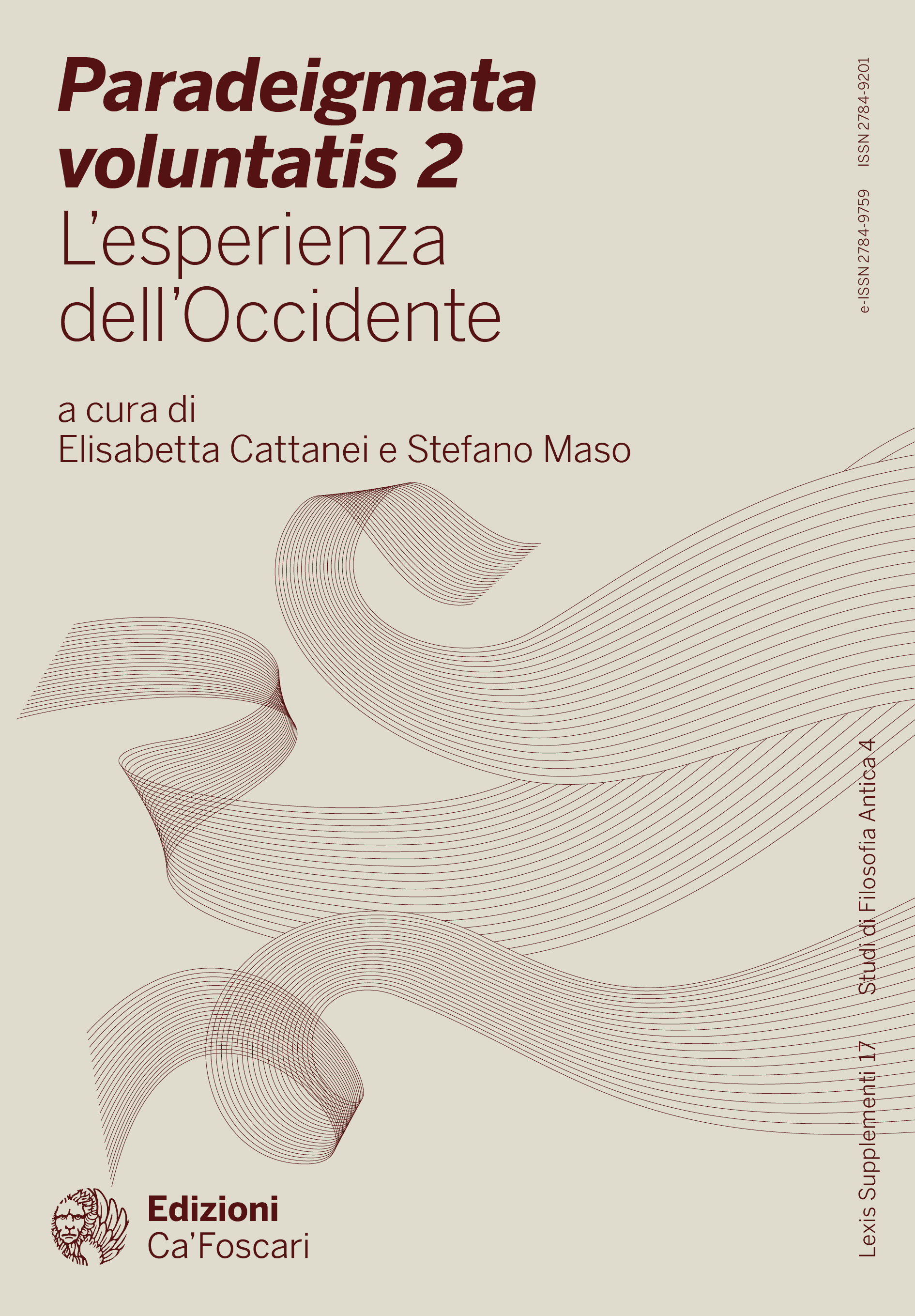
Paradeigmata voluntatis 2
March 17, 2025 -
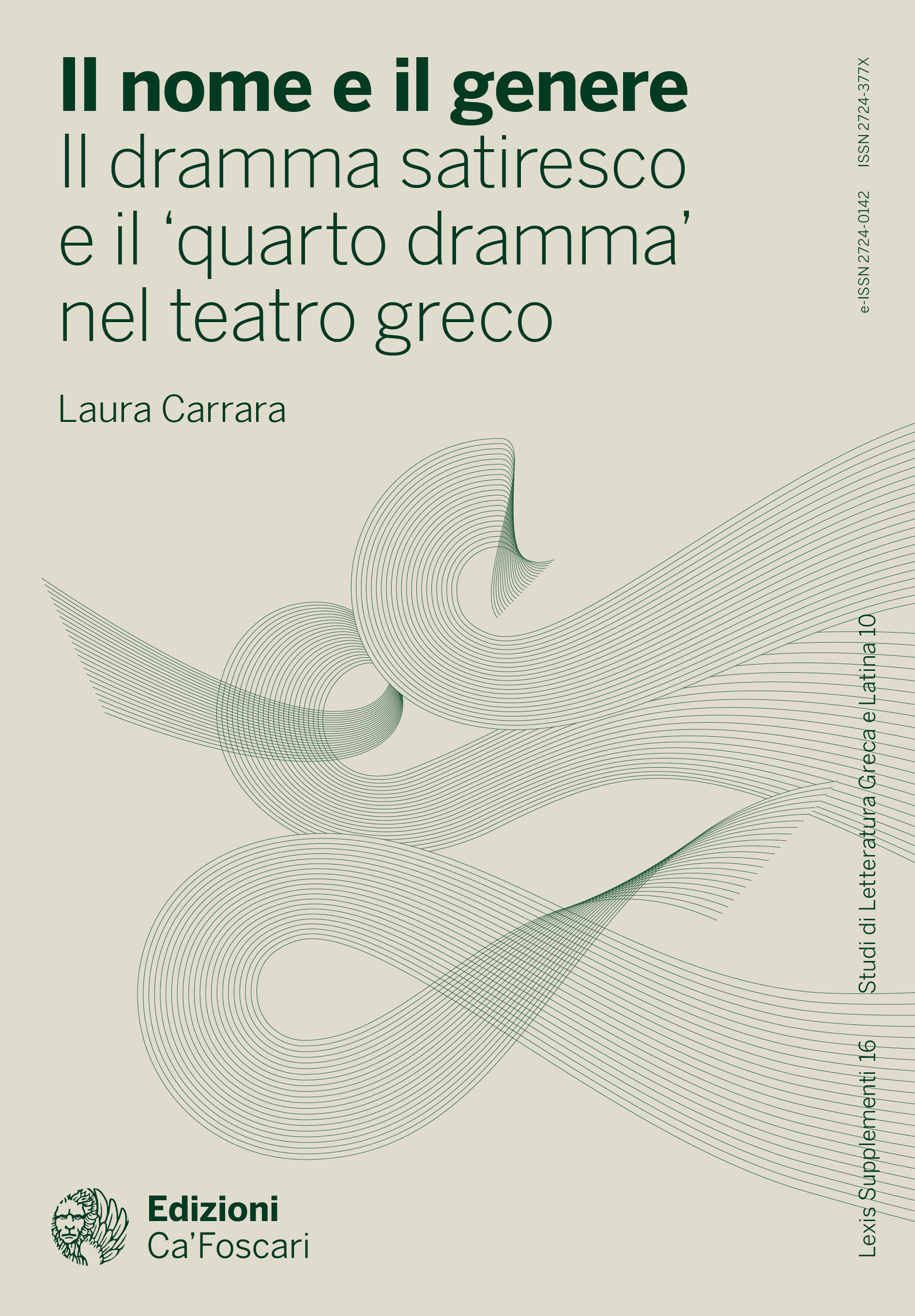
The Name and Gender
Sept. 26, 2024 -
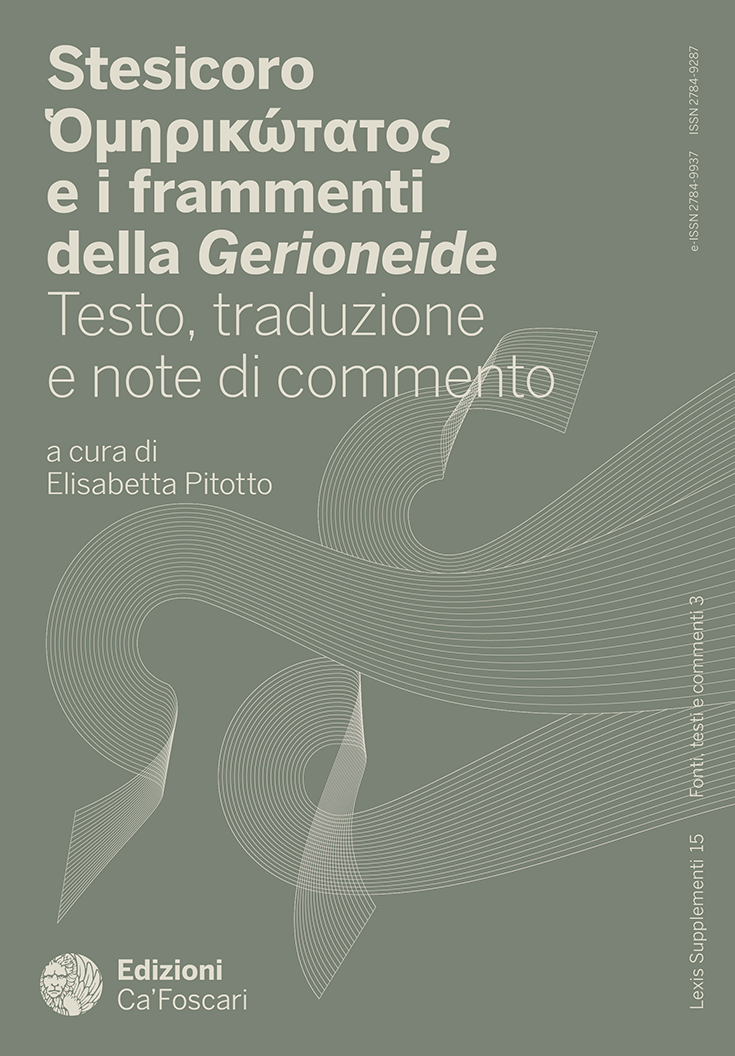
Stesicoro Ὁμηρικώτατος e i frammenti della Gerioneide
June 7, 2024 -
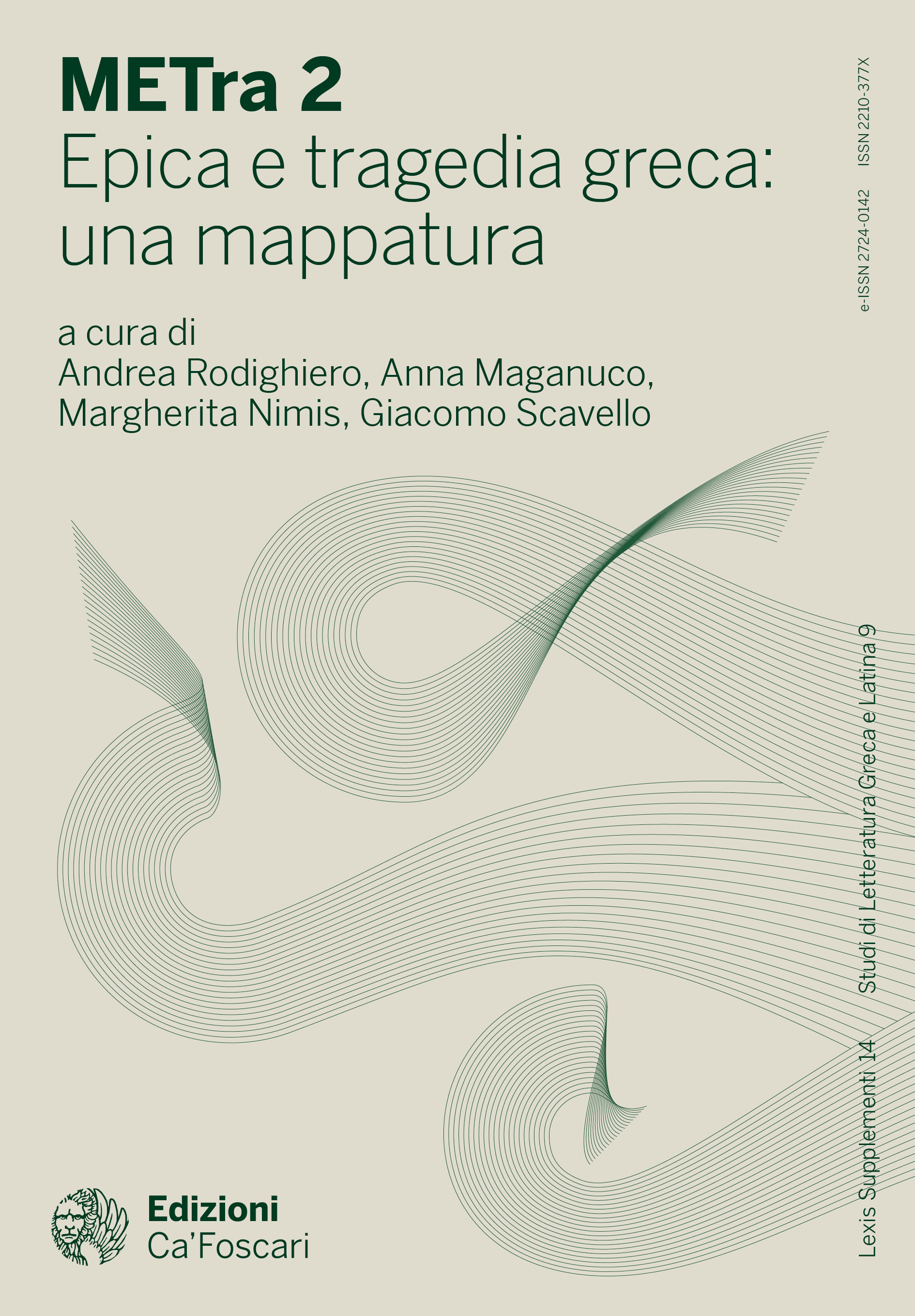
METra 2
Dec. 21, 2023 -
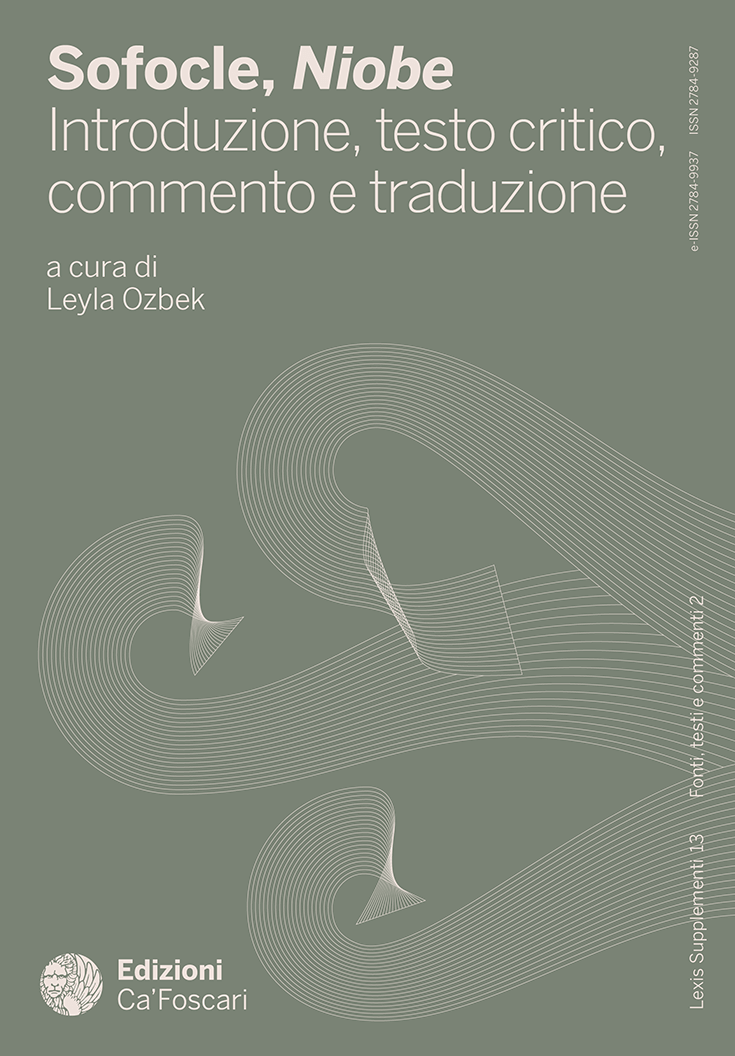
Sofocle, Niobe
Dec. 20, 2023 -

Il mito degli Atridi dal teatro antico all’epoca contemporanea
July 7, 2023 -

METra 1
Dec. 14, 2022 -

Classic and Contemporary Agamemnon
Dec. 13, 2022 -

Animus. A Study of Seneca's Psychology
Nov. 17, 2022 -
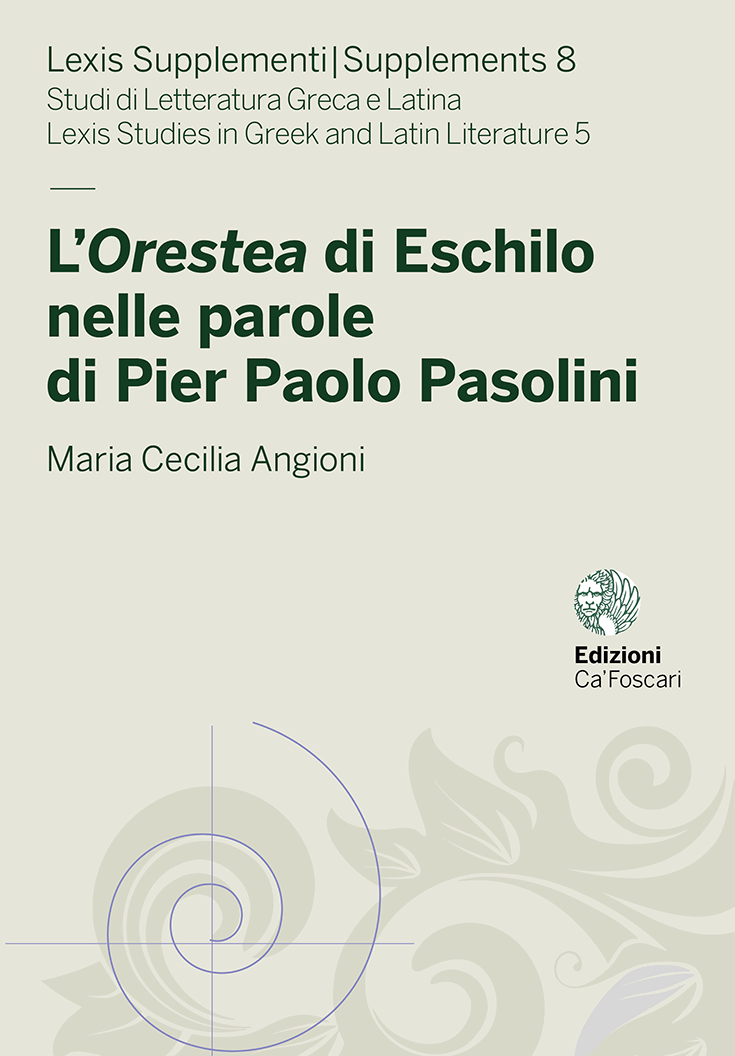
The Oresteia of Aeschylus in the Words of Pier Paolo Pasolini
May 30, 2022 -
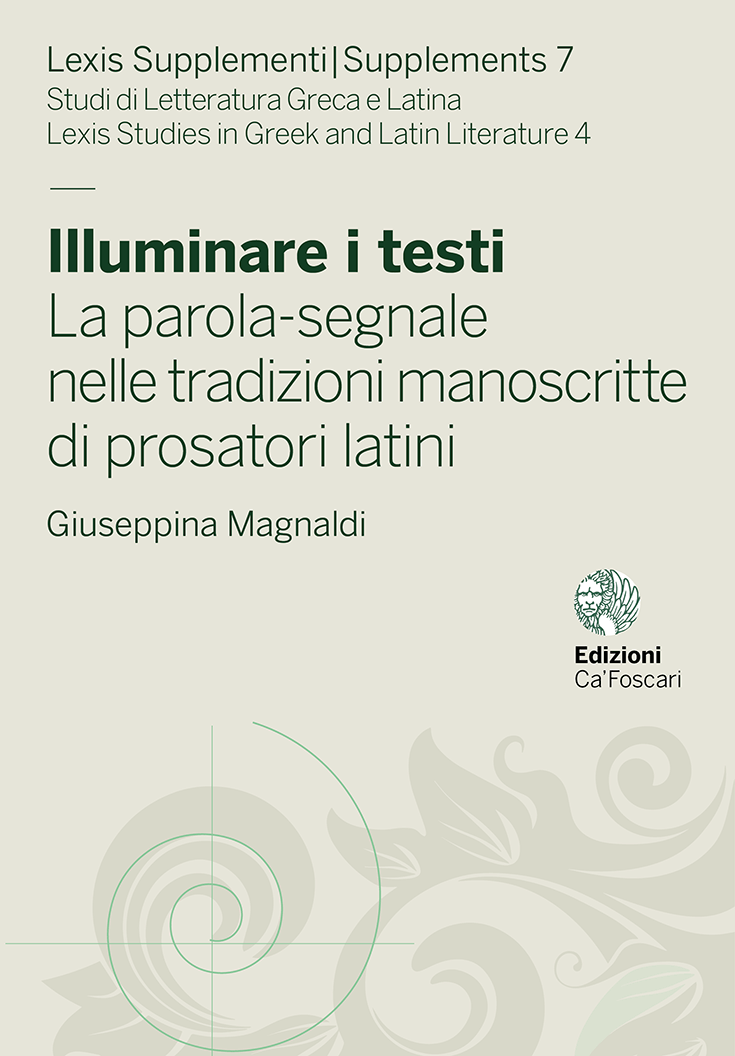
Illuminating Texts
May 23, 2022 -
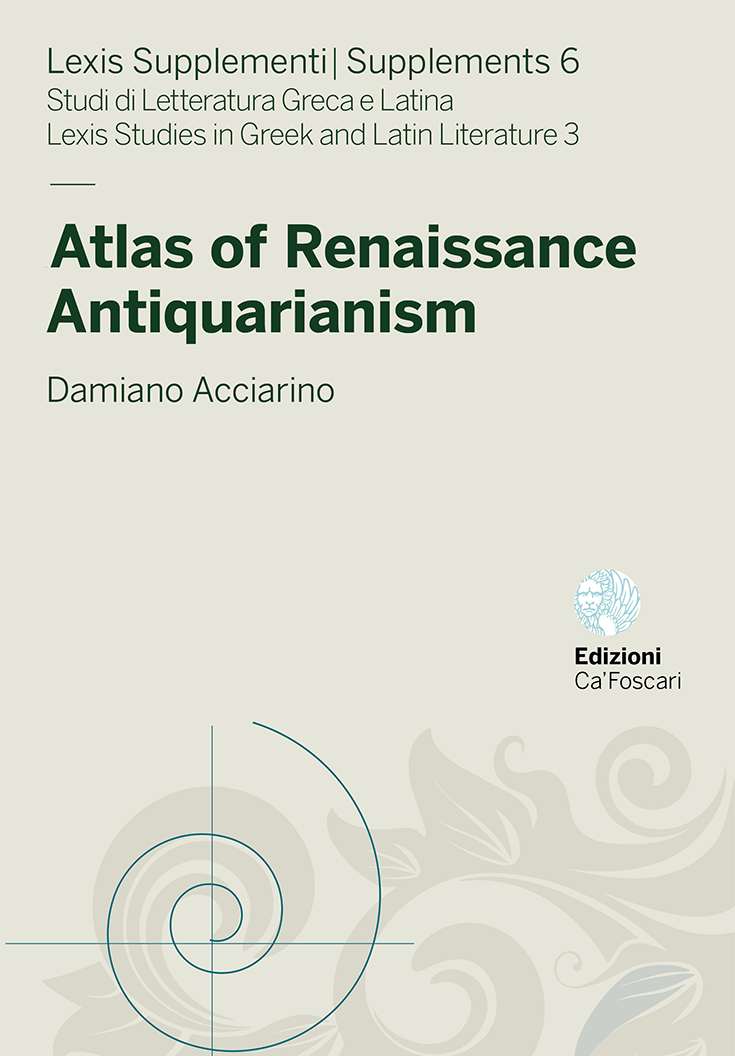
Atlas of Renaissance Antiquarianism
Feb. 2, 2022 -
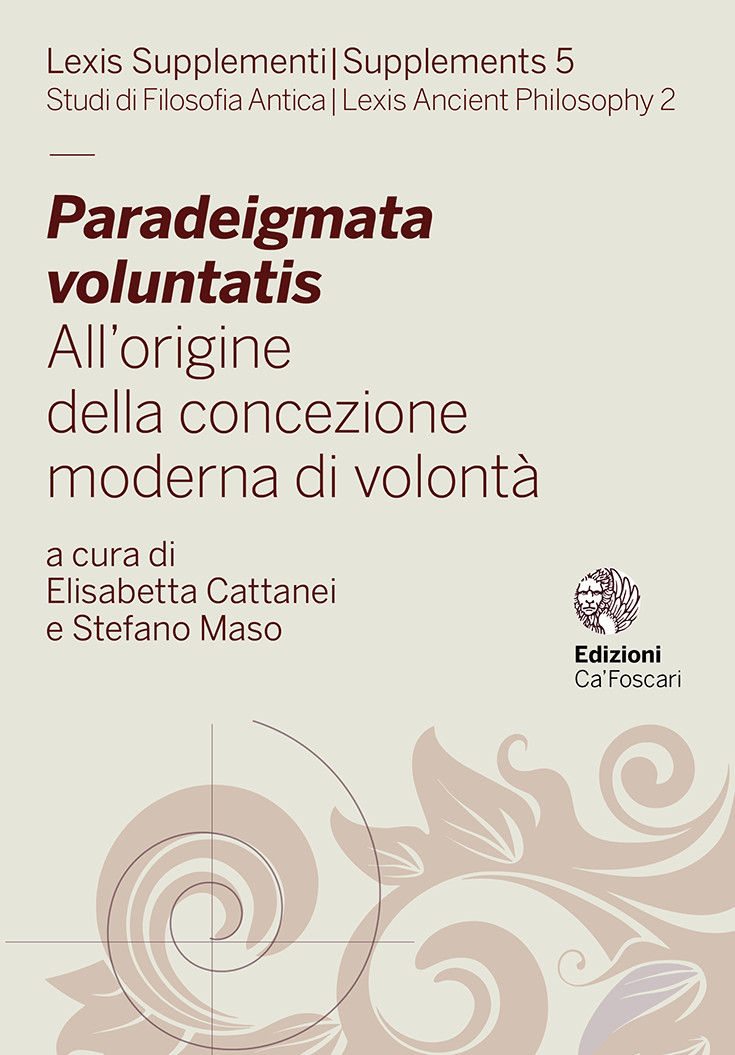
Paradeigmata voluntatis
Dec. 13, 2021 -
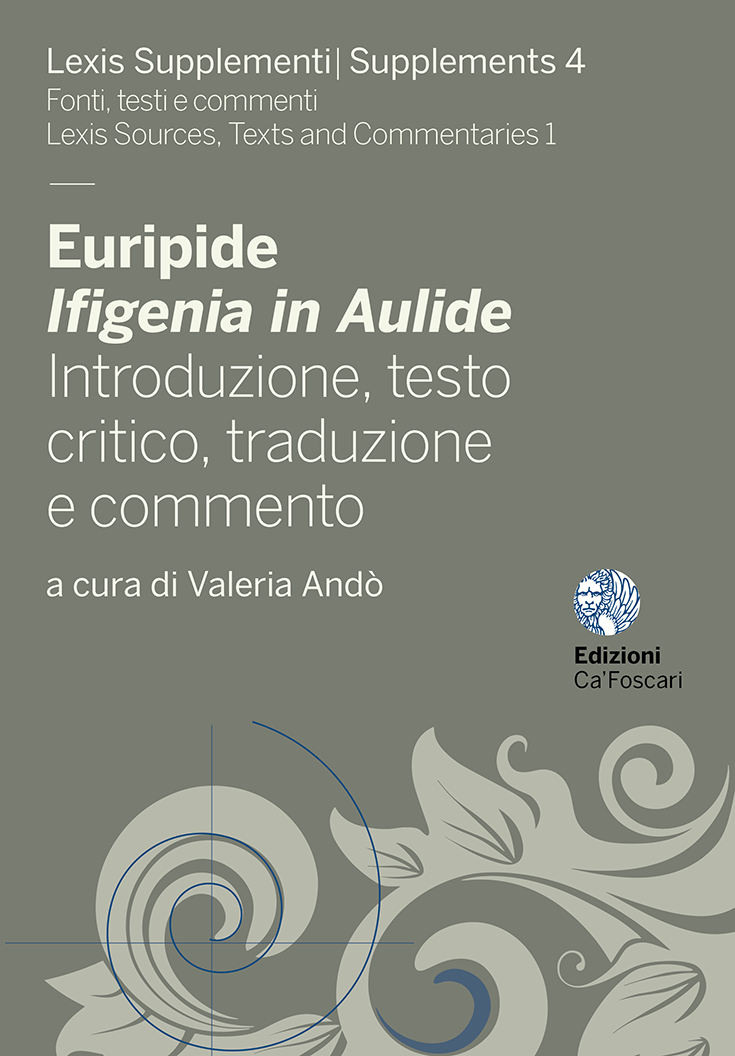
Euripide, Ifigenia in Aulide
May 21, 2021 -
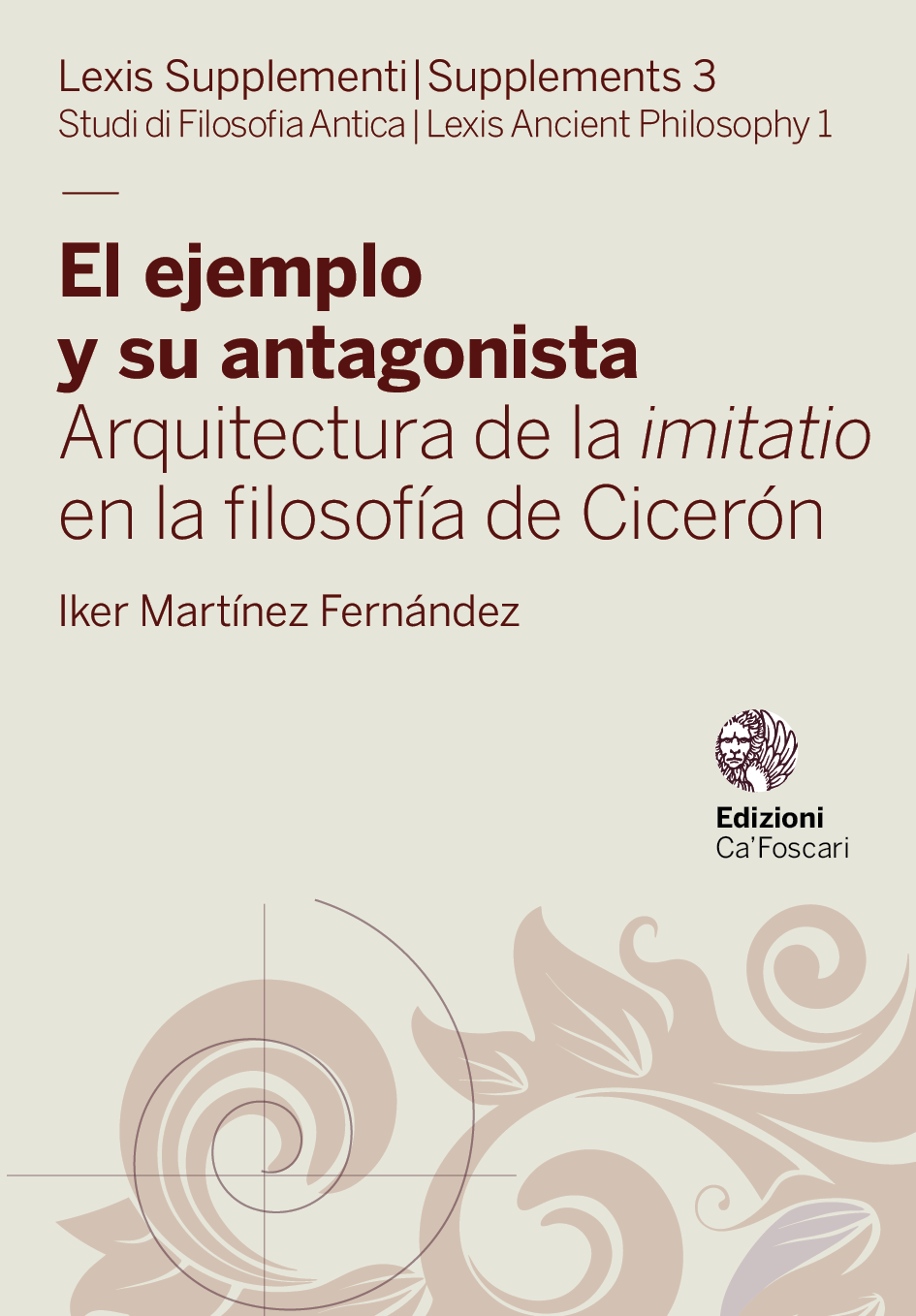
The Example and its Antagonist
April 22, 2021 -
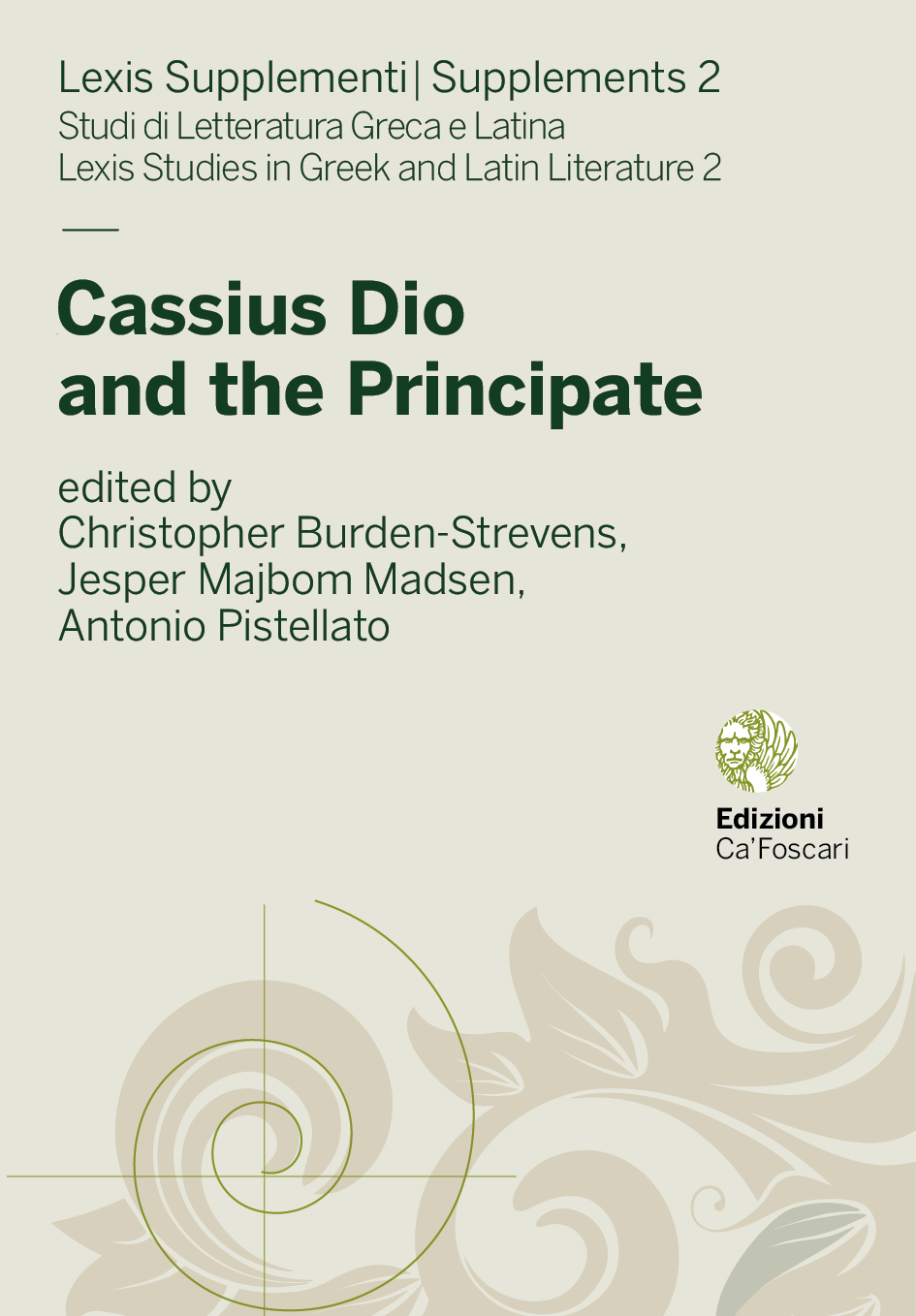
Cassius Dio and the Principate
Dec. 21, 2020 -
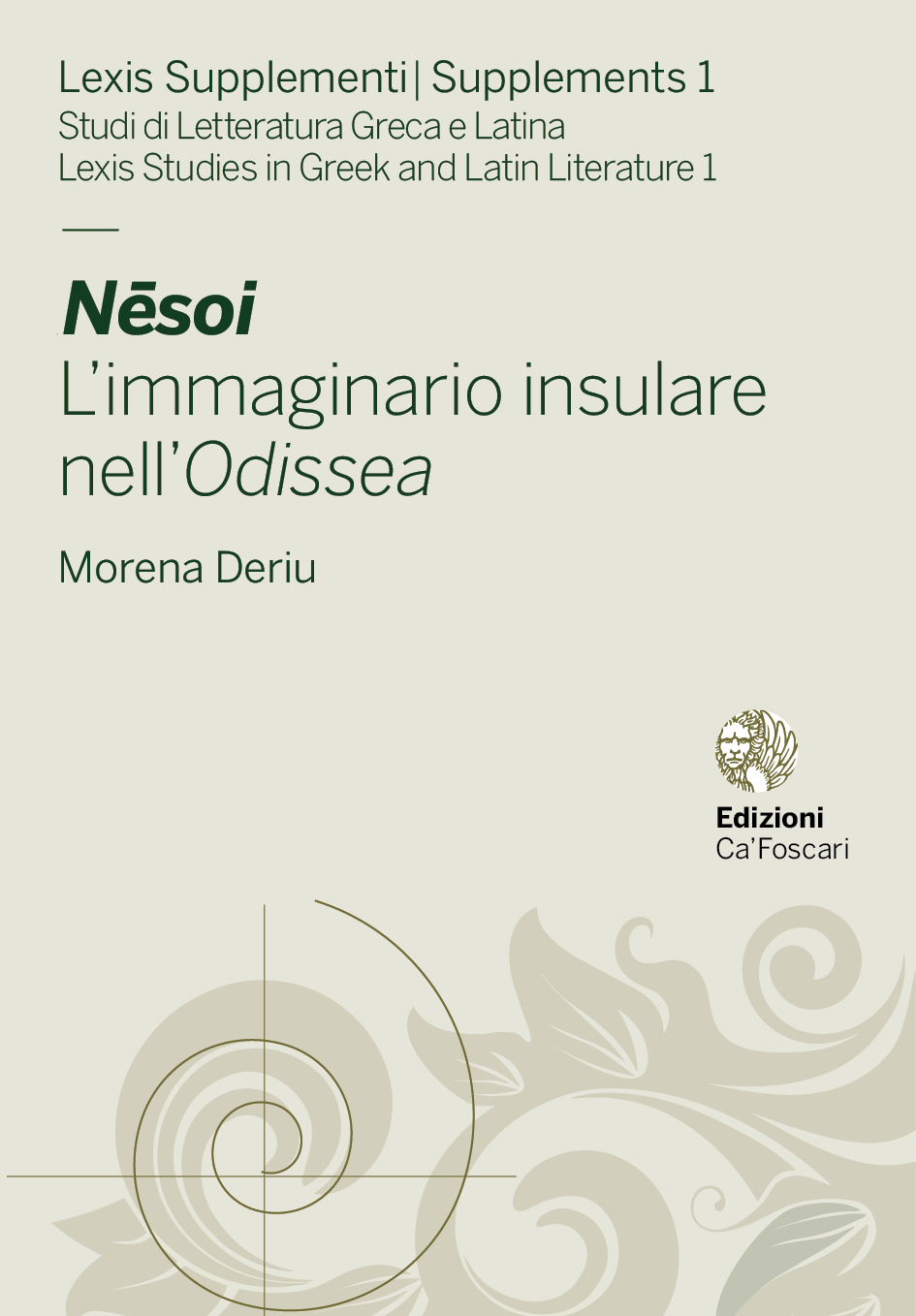
Nēsoi. Island imagery in the Odyssey
Oct. 30, 2020
Paolo Mastandrea, Università Ca’ Foscari Venezia, Italia
Enrico Medda, Università di Pisa, Italia
Martina Venuti, Università Ca’ Foscari Venezia, Italia
Editors-in-Chief of the subseries Lexis Ancient Philosophy
Carlos Lévy, Université Paris-Sorbonne, Paris IV, France
Stefano Maso, Università Ca’ Foscari Venezia, Italia
Advisory board of the subseries Lexis Studies in Greek and Latin Literature
Giuseppina Basta Donzelli, già Università degli Studi di Catania, Italia
Luigi Battezzato, Scuola Normale Superiore di Pisa, Italia
Riccardo Di Donato, già Università di Pisa, Italia
Paolo Eleuteri, Università Ca’ Foscari Venezia, Italia
Michel Fartzoff, Université de Franche-Comté, France
Alessandro Fusi, Università della Tuscia, Italia
Massimo Gioseffi, Università degli Studi di Milano, Italia
Liana Lomiento, Università degli Studi di Urbino «Carlo Bo», Italia
Giuseppina Magnaldi, già Università degli Studi di Torino, Italia
Silvia Mattiacci, Università degli Studi di Siena, Italia
Giuseppe Mastromarco, già Università degli Studi di Bari «Aldo Moro», Italia
Raffaele Perrelli, Università della Calabria, Italia
Advisory board of the subseries Lexis Ancient Philosophy
Douglas Cairns, University of Edinburgh, UK
Walter Cavini, Alma Mater Studiorum Università di Bologna, Italia
Elisabetta Cattanei, Università Cattolica del Sacro Cuore, Milano
Michel Fattal, Université Grenoble Alpes, France
Alain Gigandet, Université Paris-Est, France
Fritz-Gregor Herrmann, Swansea University, UK
Pierre-Marie Morel, Université Paris I – Sorbonne, France
Phillip Mitsis, New York University, USA
Carlo Natali, Università Ca’ Foscari Venezia, Italia
Monte Ransome Johnson, University of California, USA
Gretchen Reydams Schils, Notre Dame University, USA
Emidio Spinelli, Sapienza Università di Roma, Italia
Jula Wildberger, American University of Paris, France
Marco Zingano, Universidade de São Paulo, Brasil
Editorial board
Federico Boschetti, ILC-CNR, Pisa; VeDPH, Università Ca’ Foscari Venezia, Italia
Laura Carrara, Università di Pisa, Italia
Carmela Cioffi, Università Ca’ Foscari Venezia, Italia
Massimo Manca, Università degli Studi di Torino, Italia
Valeria Melis, Università degli Studi di Cagliari; Università Ca’ Foscari Venezia, Italia
Luca Mondin, Università Ca’ Foscari Venezia, Italia
Stefano Novelli, Università degli Studi di Cagliari, Italia
Leyla Ozbek, Università di Pisa, Italia
Giovanna Pace, Università degli Studi di Salerno, Italia
Antonio Pistellato, Università Ca’ Foscari Venezia, Italia
Paolo Scattolin, Università di Verona, Italia
Matteo Taufer, Ricercatore indipendente
Olga Tribulato, Università Ca’ Foscari Venezia, Italia
Use the form to submit a proposal.
Submit a proposalinput
Dipartimento di Studi Umanistici
Palazzo Malcanton Marcorà
Dorsoduro 3484/D
30123 Venezia
The article processing charges are regulated by the Publisher. For more information please visit: Publish with us.
The Scientific Direction of the series is responsible for the selection of the reviewers and the type of peer review on the basis of the specific features of the proposed volume. The series applies three types of peer review: double blind peer review, open peer review, and a mixed review in which one of the two reviewers is a member of the Advisory Board or the Scientific Direction and the other is external and ‘blind’ (the reviewer is unaware of the identity of the author and the author is unaware of the identity of the reviewer).
The reviewers are independent of the authors and not affiliated with the same institution.
The Series’ Editor-in-Chief guarantees the proper execution of the peer review process for every book published in the Series.
Peer review policies for the different sections:
- Complete volume/issue: subject to peer review
- Monographs/essays/articles: subject to peer review
- Introductions, prefaces: no peer review
- Reviews: no peer review
- Editorials: no peer review
Warnings
Texts that will be uploaded to the portal for the peer review process must be strictly anonymous: any element contained in the body of the text or in the notes must not allow the reviewer to identify the author (remember to delete your name from the 'author' entry in the file properties).
Each text must be accompanied by five (5) keywords and an abstract in English of a maximum length of 700 characters including spaces.
Footnotes: footnotes only. Cite according to the Anglo-Saxon ‘Name-Year’ system (see below).
Greek font: a Unicode font must be used.
Verse and page numbers must be abbreviated: e.g. 345-7
Modern authors: in the text, first names consistently in abbreviated form: e.g. S. Panciera, P. Mastandrea. No spaces between abbreviated double names: e.g. M.L. West and not M. L. West. For internal references use citation on the Anglo-Saxon model, with abbreviated numbers (Name-Year: e.g. Wilamowitz 1914, 115-26).
Characters
The basic character is the Roman.
Latin phrases in the text go in italics (including words such as infra and supra) except in cases of a quotation from a modern work where the text goes in the round between the double quotation marks (“ ”).
Foreign words in their original spelling that have not entered into common usage go in italics: e.g. Leitmotiv, Wortstellung.
Phrases in Greek characters never go in italics.
Common abbreviations:
- Compare: cf.
- Following(s): f./ff.
- Appendix: app.
- Article: art.
- Chapter: chap.
- Column(s): c./cc.
- Eccetera: etc.
- Publisher(s): ed./edd.
- Edition(s): ed./edd.
- Example: ex.
- Exempli gratia: e.g.
- Line(s): l./ll.
- Cited place(s): l.c./ll.cc.
- Manuscript(s): MS/MSS
- Footnote: fn.
- Number(s): no./nos.
- Paragraph: par. [however, use the conventional sign § if possible].
- Scholium ad locum: schol. ad l.
- Scholium ad locum laudatum: schol. l.c.
- Sezione/i: sez./sezz.
- Sub voce/ibus: s.v./s.vv.
- Supplement: suppl.
- Table(s): tab./tabs
- Translation: transl.
- Varia/e lectio/nes: v.l./vv.ll.
- Verse(s): v./vv.
- Volume(s): vol./vols.
For works, manuals, dictionaries, encyclopaedias, widely consulted instruments, use abbreviated quotations in italics: e.g. RE, GH, ThlL, LSJ.
Ancient authors
- within a quotation use a full stop: Hor. carm. 1.2.4.
- between quotations of the same author use comma and space: Ov. ars 1.27, 3.48, met. 10.149-51, 158
- between quotations by different authors use semicolon: Verg. Aen. 3.250, 446; Hor. carm. 1.2, 4, 1.4.1, 27.
The citations follow the abbreviations given by ThlL for Latin (e.g. Hor. ars and not Ars) and by LSJ for Greek (see exceptions in the section below).
Abbreviations in derogation of LSJ:
Aesch. not A. → Aesch. Suppl. Sept. Pers. PV Ag. Ch. Eum.
Soph. not S. → Soph. Ai. El. OT Ant. Tr. Phil. OC
Eur. not E. → Eur. Cycl. Alc. Med. Her . Hipp. Andr . Hec. Suppl. HF Ion Tro. IT El. Hel. Pho. Or. Ba. IA Rh.
Aristoph. not Ar. → Aristoph. Ach. Eq. Nub. Vesp. Av. Pax Lys. Thesm. Ran. Eccl. Pl.
Bacch. not B.
Dem. not D.
Pind. not Pi. → Pind. Pyth. Ol. Isth. Nem.
Thuc. not Th.
Xen. not X.
Papyri:
Italics used: P. Oxy.
Journals:
Journal names should be italicised; they should not be put in inverted commas. The abbreviations of the Année Philologique are generally adopted. Names of journals not included in the Année Philologique should be written in full.
FINAL BIBLIOGRAPHY AND BIBLIOGRAPHICAL ABBREVIATIONS IN FOOTNOTES
Books:
Parker, R. (1983). Miasma: Pollution and Purification in Early Greek Religion. Oxford: Oxford University Press.
Radt, S.L. (1977). Tragicorum Graecorum fragmenta. Vol. 4, Sophocles. Göttingen: Vandenhoek & Ruprecht.
Krumeich, R.; Pechstein, N.; Seidensticker, B. (Hrsgg) (1999). Das griechischen Satyrspiel. Darmstadt: Wissenschaftliche Buchgesellschaft.
Journal articles:
Boardman, J. (1975). «Herakles, Peisistratos and Eleusis». JHS, 95, 1-12.
Armstrong, D.; Hanson, A.E. (1987). «The Virgin’s Voice and Neck. Aeschylus, Agamemnon 245 and Other Texts». BICS, 33, 97-100.
Volume chapters:
Harvey, D. (2005). «Tragic Thrausmatology: The Study of the Fragments of Greek Tragedy in the Nineteenth and Twentieth Centuries». McHardy, F.; Robson, J.; Harvey, D. (eds), Lost Dramas of Classical Athens: Greek Tragic Fragments. Exeter: Liverpool University Press, 328-61.
Bibliographic abbreviations ‘Name year’ will be used in the notes, according to these examples:
Parker 1983, 254-7; Harvey 2005, 328; Krumeich, Pechstein, Seidensticker 1999, 25-30.
For a complete list of editorial standards, please visit ‘Editorial Guidelines’.
Ethical Code of Lexis Supplements
Lexis Supplements is a peer-reviewed scientific book series whose policy is inspired by the COPE (Committee on Publication Ethics) Ethical Code.
Publisher’s responsibilities
The Publisher must provide the Book Series with adequate resources and the guidance of experts, in order to carry out its role in the most professional way, aiming at the highest quality standard.
The Publisher must have a written agreement that defines the relationship with the owner of the Book Series and/or the Editor-in-Chief. The agreement must comply with the Code of Behavior for Publishers of Scientific Journals, as established by COPE.
The relationship among the Editor-in-Chief, the Advisory Board and the Publisher is based on the principle of publishing independence.
Editors’ responsibilities
The Editor-in-Chief and the Advisory Board of Lexis Supplements alone are responsible for the decision to publish the submitted works.
Submitted works, after having been checked for plagiarism by means of the anti-plagiarism software Compilatio that is used by the University and is made available to us, will be sent to at least two reviewers. Final acceptance presumes the implementation of possible amendments, as required by the reviewers and under the supervision of the Lexis Supplements Editor-in-Chief.
The Lexis Supplements Editor-in-Chief and Advisory Board must evaluate each submitted paper in compliance with the Book Seriesʼ policy, i.e. exclusively on the basis of its scientific content, without discrimination of race, sex, gender, creed, ethnic origin, citizenship, or the scientific, academic and political position of the Authors.
Allegations of misconduct
If the Lexis Supplements Editor-in-Chief and Advisory Board notice (or receive notifications of) mistakes or inaccuracies, conflict of interest or plagiarism in a published book, they will immediately warn the Author and the Publisher and will undertake the necessary actions to resolve the issue. They will do their best to correct the published content whenever they are informed that it contains scientific errors or that the authors have committed unethical or illegal acts in connection with their published work. If necessary, they will withdraw the book or publish a recantation.
All complaints are handled in accordance with the guidelines published by the COPE.
Concerns and complaints must be addressed to the following e-mail ecf_support@unive.it. The letter should contain the following information:
- complainant’s personal information;
- title, author(s), publication date, DOI;
- complaint(s);
- declaration that the complainant has no conflict of interest, or declaration of an actual or potential conflict of interest.
Authors’ responsibilities
Stylesheet
Authors must follow the Guidelines for Authors to be downloaded from the Lexis Supplements website.
Authors must explicitly state that their work is original in all its parts and that the submitted paper has not been previously published, nor submitted to other publishers, until the entire evaluation process is completed. Since no paper or book gets published without significant revision, earlier dissemination in conference proceedings or working papers does not preclude consideration for publication, but Authors are expected to fully disclose publication/dissemination of the material in other closely related publications, so that the overlap can be evaluated by the Lexis Supplements Editor-in-Chief.
Authorship
Authors are strongly encouraged to use their ORCID iD when submitting a manuscript. This will ensure the authors’ visibility and correct citation of their work.
Authorship must be correctly attributed; all those who have given a substantial contribution to the design, organisation and accomplishment of the research the book is based on, must be indicated as Co-Authors. Please ensure that: the order of the author names is correct; the names of all authors are present and correctly spelled, and that affiliations are up-to-date.
The respective roles of each co-author should be described in a footnote. The statement that all authors have approved the final version should be included in the disclosure.
Conflicts of interest and financing
Authors, under their own responsibility, must avoid any conflict of interest affecting the results obtained or the interpretations suggested. The Lexis Supplements Editor-in-Chief will give serious and careful consideration to suggestions of cases in which, due to possible conflict of interest, an Author’s work should not be reviewed by a specific scholar. Authors should indicate any financing agency or the project the book stems from.
Quotations
Authors must see to it that all works consulted be properly quoted. If works or words of others are used, they have to be properly paraphrased or duly quoted. Quotations between “double quotes” (or «angled quotation marks» if the text is written in a language other than English) must reproduce the exact wording of the source; under their own responsibility, Authors should carefully refrain from disguising a restyling of the source’s wording, as though it was the original formulation.
Any form of excessive, inappropriate or unnecessary self-citation, as well as any other form of citation manipulation, are strongly discouraged.
Ethical Committee
Whenever required, the research protocols must be authorised in advance by the Ethical Committee of Ca’ Foscari University of Venice.
Emendations
When Authors find a mistake or an inaccuracy in their own work, they must immediately warn the Lexis Supplements Editor-in-Chief, providing all the information needed to make the due adjustments.
Reviewers’ responsibilities
Goal
By means of the peer-review procedure, reviewers assist the Lexis Supplements Editor-in-Chief and Advisory Board in taking decisions on the submitted works. They are expected to offer the Authors suggestions as to possible adjustments aimed at improving their contribution submission.
Timing and conflicts of interest
If a reviewer does not feel up to the task of doing a given review, or if she/he is unable to read the work within the agreed schedule, she/he should notify the Lexis Supplements Editor-in-Chief. Reviewers must not accept texts for which there is a conflict of interest due to previous contributions or to a competition with a disclosed author (or with an author they believe to have identified).
Confidentiality
The content of the reviewed work must be considered confidential and must not be used without explicit authorisation by the Author, who is to be contacted via the editor-in-chief. Any confidential information obtained during the peer review process should not be used for other purposes.
Collaborative attitude
Reviewers should see themselves not as adversaries but as advocates for the field. Any comment must be done in a collaborative way and from an objective point of view. Reviewers should clearly motivate their comments and keep in mind the Golden Rule of Reviewing: “Review for others as you would have others review for you”.
Plagiarism
Reviewers should report any similarity or overlapping of the work under analysis with other works known to them.
